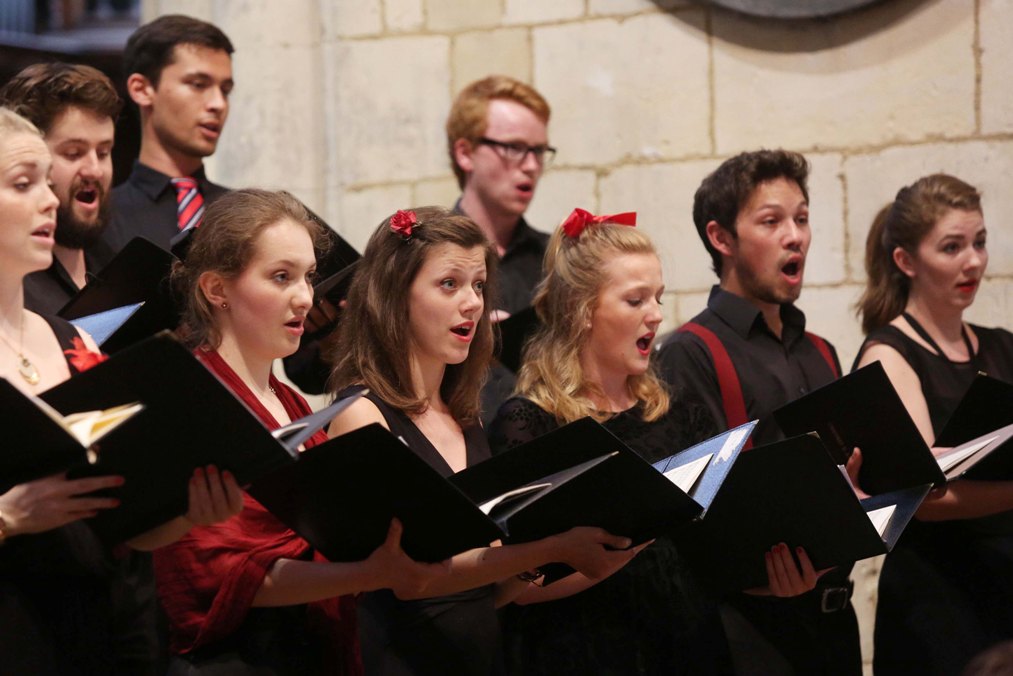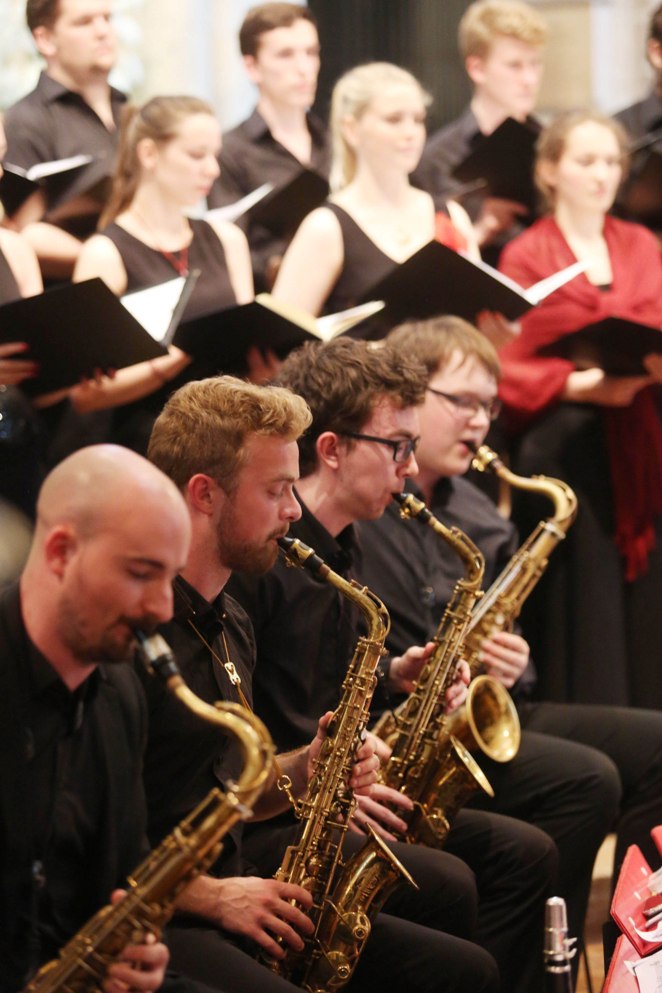NYCC, NYJO, Southwark Cathedral | reviews, news & interviews
NYCC, NYJO, Southwark Cathedral
NYCC, NYJO, Southwark Cathedral
Best of Britain's young choristers and jazz musicians in fabulous Shakespeare homage

Cleopatra in her barge gliding down the nave of Southwark Cathedral? Only figuratively, in the hypnotic “Half the Fun” movement of Duke Ellington’s constantly surprising Shakespeare compendium Such Sweet Thunder. Still, it wouldn’t be that much stranger than the combination of a jazz orchestra and a chamber choir – so superlative as not to need the “youth” in their names observed – celebrating Shakespeare in his local place of worship.
It worked brilliantly. That was partly because not only the layered sound of the National Youth Chamber Choir of Great Britain but also, more surprisingly, the harmonies of the National Youth Jazz Orchestra’s sax and brass choirs were well cradled by the modest cathedral echo – nothing like as bad as that of St Paul’s, a disastrous venue for big events in the underpublicised City of London Festival of which this was a part. The other reason for a constant source of pleasure was because the two groups were mostly kept apart, providing one of the best and most original programmes I can remember in the City.
 Weddings were celebrated at the end of each half. Where Shakespeare’s words were concerned, it seemed a bad idea, at least in Southwark Cathedral and with a relatively small number of voices, to pit a choir against a big band sound as Peter Churchill did in the newly-commissioned Journey’s End; only in the prologue and epilogue of a slightly amorphous medley could you make out the rather felicitously set verse when supported by piano, double bass and discreet percussion. Karl Jenkins’ Scatty!, on the other hand, originally written for choir only and skilfully adapted to include the jazz instruments, needed no apology. Shakespeare had left the building along with any need to project the text and the final celebration was infectious.
Weddings were celebrated at the end of each half. Where Shakespeare’s words were concerned, it seemed a bad idea, at least in Southwark Cathedral and with a relatively small number of voices, to pit a choir against a big band sound as Peter Churchill did in the newly-commissioned Journey’s End; only in the prologue and epilogue of a slightly amorphous medley could you make out the rather felicitously set verse when supported by piano, double bass and discreet percussion. Karl Jenkins’ Scatty!, on the other hand, originally written for choir only and skilfully adapted to include the jazz instruments, needed no apology. Shakespeare had left the building along with any need to project the text and the final celebration was infectious.
Not that you could fault the NYCC in trying for a crisp delivery. It might be because I knew the texts of Vaughan Williams’ Three Shakespeare Songs that I could make out Ariel’s, Prospero’s and Midsummer Night’s Dream Fairy’s fantasies; the music and its delivery were ravishing, offering perspectives and tonal shifts you’d expect from the very best of chamber choirs. Which these 24 18-25 year olds, many of them on scholarships that will perfect their training for future careers, already are.
 The peerless guidance of renaissance man Ben Parry made all the difference. Parry was once a Swingler, and here larger forces than that indestructible phenomenon had just as much focused fun with the late Ward Swingle’s wonderful treatment of “It was a Lover and his Lass”. It always surprises me how the Sonnets, so musically rich in themselves, still bring out the best in word-setting; in homages ranging from the simple – Owain Park’s “When Love Speaks” – to the touches of innovation in Janet Wheeler’s “Music to Hear”, it was Swede Nils Lindberg’s bittersweet take on “Shall I Compare Thee to a Summer’s Day” which proved the most spellbinding.
The peerless guidance of renaissance man Ben Parry made all the difference. Parry was once a Swingler, and here larger forces than that indestructible phenomenon had just as much focused fun with the late Ward Swingle’s wonderful treatment of “It was a Lover and his Lass”. It always surprises me how the Sonnets, so musically rich in themselves, still bring out the best in word-setting; in homages ranging from the simple – Owain Park’s “When Love Speaks” – to the touches of innovation in Janet Wheeler’s “Music to Hear”, it was Swede Nils Lindberg’s bittersweet take on “Shall I Compare Thee to a Summer’s Day” which proved the most spellbinding.
Ellington has to be the single star of the evening, since it would be invidious to choose the best of the many stunning NYJO soloists (sax ensemble pictured above) who took their rounds of applause in the odyssey from Othello to Antony and Cleopatra. Among Ellington’s singular if sometimes oblique inventions there was a proper, iambic pentametered sonnet-without-words "for Hank Cinq" (love it); a sassy waltz for Lady Mac with creepier upward straining chromatics than conductor and lively co-presenter Mark Armstrong seemed willing to credit – this Lady is no mere party animal; and touches of selective instrumentation which show the hand of a master. Shakespeare 400 may be yet to come, but already we’ve got a clear front-runner among the tributes.
rating
Share this article
The future of Arts Journalism
You can stop theartsdesk.com closing!
We urgently need financing to survive. Our fundraising drive has thus far raised £49,000 but we need to reach £100,000 or we will be forced to close. Please contribute here: https://gofund.me/c3f6033d
And if you can forward this information to anyone who might assist, we’d be grateful.

Subscribe to theartsdesk.com
Thank you for continuing to read our work on theartsdesk.com. For unlimited access to every article in its entirety, including our archive of more than 15,000 pieces, we're asking for £5 per month or £40 per year. We feel it's a very good deal, and hope you do too.
To take a subscription now simply click here.
And if you're looking for that extra gift for a friend or family member, why not treat them to a theartsdesk.com gift subscription?

Add comment